Considering designing a functioning Kitchen? I believe one of the first things on your mind is the type of material you want for your kitchen countertop. Years ago, the type of materials available for countertops was limited; you either went for plastic laminate or wood butcher block.
Today, however, there are a number of kitchen countertop materials available to choose from and it is OK not knowing which to choose.
In this blog post, we will look at various types of countertop materials, along with their characteristics, benefits, and drawbacks. With all this information, you should be able to decide which material you want for your kitchen countertop, so let’s dive right into it.
Types Of Kitchen Countertop Materials
1. Granite
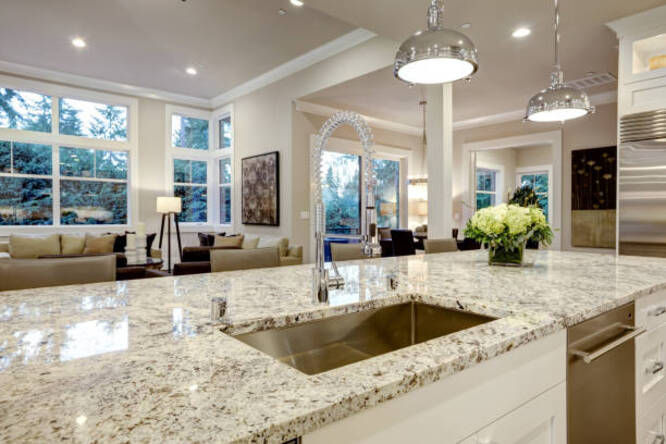
When you talk about elegance, a granite countertop is the right choice; it is one of the most elegant and high-end materials you will likely come across. Known for its durability, strength, heat resistance, and beauty, it also comes in a variety of colors and patterns to choose from.
Pros
- Resistant to heat
- Resistant to abrasion
- Very strong and durable countertop material
- Variety of colors and patterns
Cons
- Expensive
- Requires regular sealing
- Very difficult to install
2. Soapstone
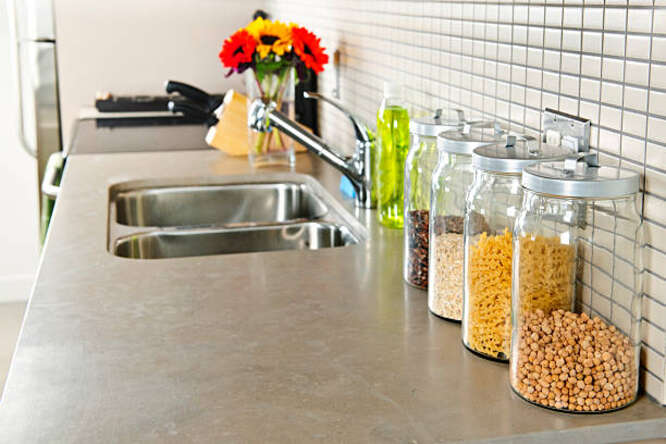
Soapstone is a natural stone consisting of mineral talcs, giving it a smooth and soft texture just like soap, hence the name soapstone. This type of countertop material is unique but has fallen short of glory due to numerous drawbacks associated with it.
Pros
- Very beautiful and unique veining and color patterns
- Non-porous
- Repairs are possible through sanding
- Resistant to heat and stains
Cons
- Not scratch resistant
- Not dent resistant
- It must be installed by a professional
- The surface is vulnerable to abrasive damage
- Requires mineral oil treatment
3. Marble
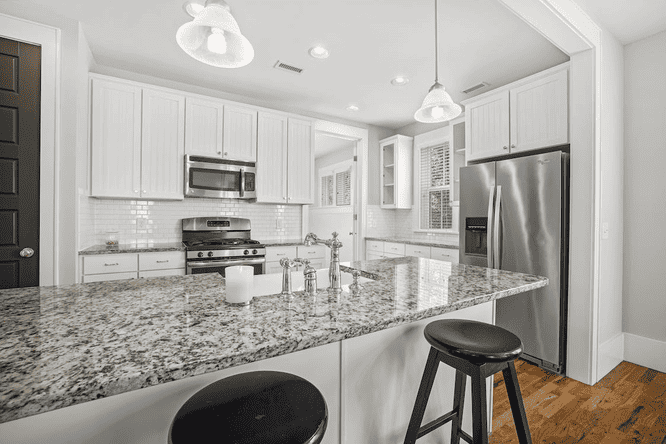
Marble is often classified as the king of countertops due to its wonderful aesthetic appeal. It comes in a wide range of colors, including grey, brown, green, taupe, etc. While they are all termed “marble,” no two types are the same, as they all come with marble veining or naturally occurring patterns.
Pros
- Resistant to heat, cracks, and breakage
- Very attractive with unique marble veining
- Long-lasting material
- Needs to be installed by a professional
Cons
- Does not hold up to heat well
- Easily absorbs spills or drips from food
- Will stain if not resealed from time to time
4. Quartz (Engineered stone)
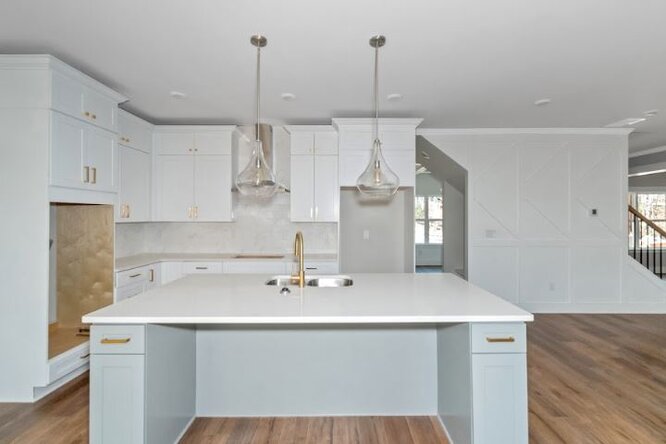
Quartz countertops which are also called engineered stone, are made mostly of quartz but also mixed with other minerals to create a strong and durable end product. It also comes in a wide range of colors and patterns to choose from.
Pros
- No sealing required
- Mold, mildew, and stain resistant
- Extremely durable
- Highly constructible (can be fabricated into any shape or size)
Cons
- Edges can chip
- Very expensive
- Quarts countertops can be damaged by heat
- Can fade if exposed to direct sunlight
- Not scratch resistant
5. Solid surface
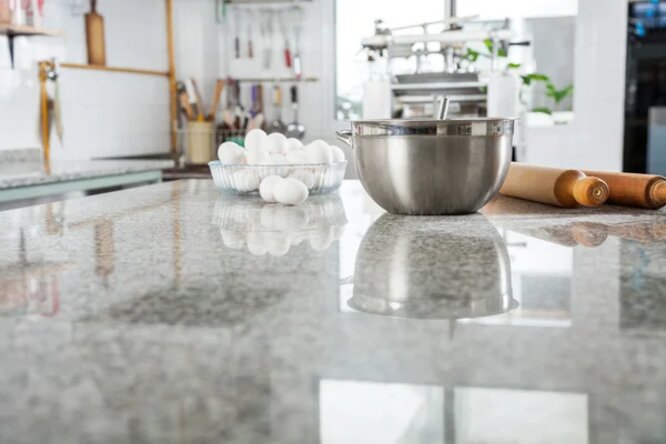
A solid surface is a material made out of a combination of acrylic particles and resin. This acrylic particles and resin blend is pressed into sheets to create the kitchen countertop. Solid surface countertops also come in a range of colors, patterns, and styles, including a great duplicate of granite and marble.
Pros
- Stain resistant
- Seams are virtually invisible
- Available in a wide range of colors and patterns
- Most damages can be sanded out
Cons
- They are not heat-resistant
- Moderately expensive
- Not scratch and dent-resistant
6. Ceramic tiles
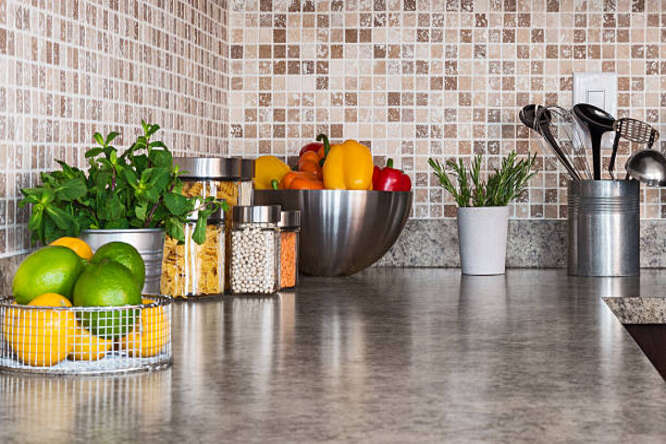
Ceramic tiles are very versatile; they are used for floors, walls, and even countertops. Tiles are made available in several shapes, patterns, styles, and sizes, so, you have various options you can choose from for your kitchen countertop.
Pros
- Very affordable
- Relatively easy to install
- Wide range of colors, patterns, and styles to choose from
Cons
- Grout lines are challenging to keep clean as they are prone to stains (opt for darker colors)
- Ceramic tiles are vulnerable to cracks because they are brittle
7. Laminates
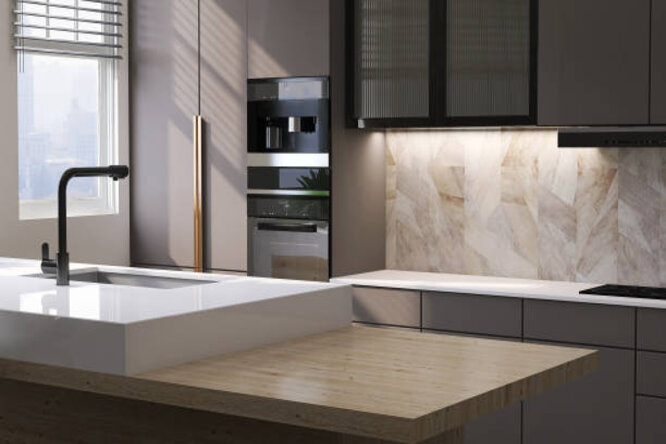
Laminates, which are also referred to as Formica, are made of particleboard, resins, plastic, and pattern paper. All of which have been seared together with the aid of heat and pressure combination. Laminates also come in a variety of styles, colors, and patterns.
Pros
- Easy Cleaning and maintenance
- Inexpensive
- Mold, mildew, and stain resistant
- Easy to install
- Stain resistant
Cons
- Might peel eventually
- Not scratch and dent-resistant
- Seams are very visible
- Repairs are kind of impossible if damaged
8. Wood butcher block
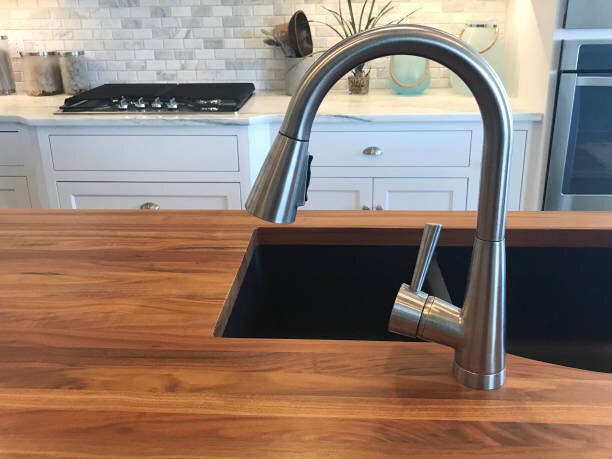
Wood butcher blocks are made from pieces of wood bonded to form a bigger slab. It can be made from all types of wood, whether maple, oak, walnut, cherry, teak, or bamboo.
Pros
- Easy to install and repair
- Easy to reseal and sand
- Cleaning wood butcher block countertops is relatively easy
- Gives the kitchen a homey, warm, and country look
- Long-lasting (if cared for properly and adequately)
Cons
- Not scratch and dent-resistant
- This material can be cracked and stained
- It can also be damaged by water (not ideal to be used near sinks)
- Fairly expensive
9. Stainless steel
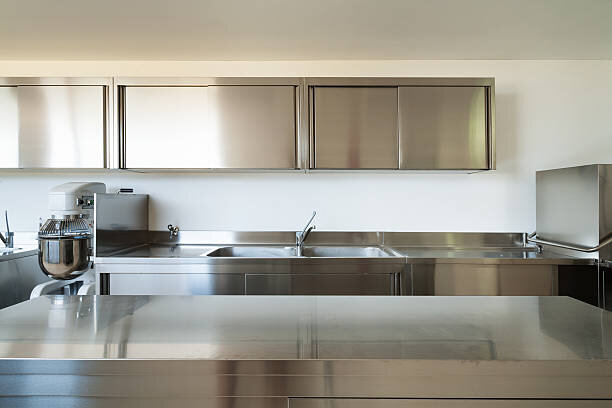
People go for stainless steel countertops mainly because it offers a modern aesthetic appeal to the kitchen. Aside from that, it is basically the easiest type of countertop to clean; all you need to do is wipe it with a cloth, soap, and water.
Pros
- Extremely durable
- Heat resistant
- Adds value to the home (that is, if you choose to resell)
- Very easy to clean
- Mold, mildew, and stain resistant
Cons
- Expensive
- It can be noisy when working on it
- Can stretch easily
10. Concrete
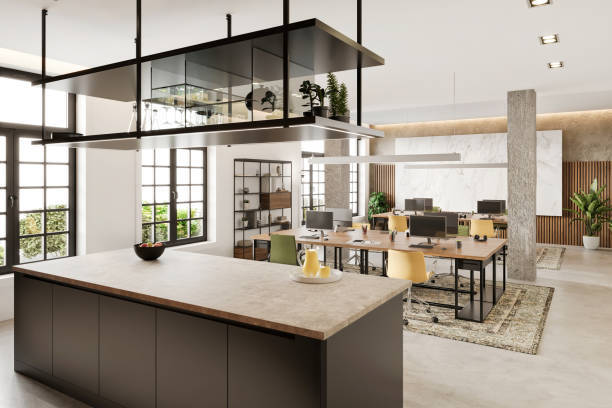
Concrete is another unique material for kitchen countertops. This material strikes a bold look, it is also almost indestructible, explaining why they are used for roads, sidewalks, driveways, foundations, and other heavy-duty constructions.
Pros
- Concrete is resistant to heat
- Concrete is also resistant to scratch
- Extremely durable
- Can be repaired if cracked
Cons
- Concrete can be an expensive choice
- Concrete countertops require high maintenance
- It has to be sealed regularly
FAQs
What is the most popular type of kitchen countertop material?
Granite is one of the most used materials for countertops.
What is the most durable type of kitchen countertop material?
When you talk of durability, Quartz is the most durable material for countertops.
What is the cheapest type of kitchen countertop material?
While the majority of the other types of material are fairly affordable, the cheapest type of countertop material is Laminate.
Wrapping things up: Types Of Kitchen Countertop Materials
For some homeowners, certain materials may be too noisy or may fade over time due to excess usage. For others, the reverse may be the case as they may not frequently use their countertops, and this is where it gets difficult. The best type of countertop material is one that offers great durability. But remember that one main factor is that it is completely functional and matches your daily routine.
Quartz countertop is often considered to be the best type because it is extremely durable and fairly affordable. However, if you happen to be on a tighter budget, a Granite countertop may be the right fit for you.
The great news is that Samkins Construction LNC has you covered, regardless of your choice. Contact us today and get the best deal.
Thanks for reading. You might also be interested in this article on the types, styles, and categories of kitchen cabinets.